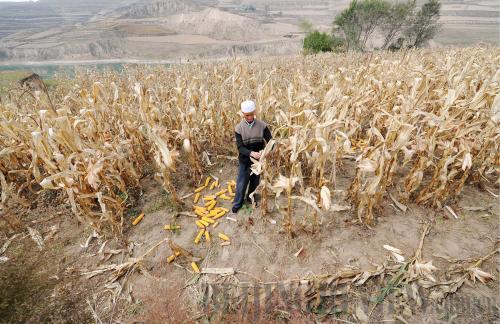|
 |
|
POVERTY STRICKEN: Farmer Wang Jinke in Xihaigu, Ningxia Hui Autonomous Region, harvests corn on October 14, 2012. Xihaigu, with its arid land, is one of the poorest counties in China (PENG ZHAOZHI) |
Real estate accounts for a large share of Chinese households' wealth, and the median percentage is 80 percent for urban households, and 60 percent for rural households. The share of real estate in a household's total assets is higher in more economically advanced regions, and for high-income and affluent households, the report said.
China's wealth Gini coefficient is higher than income distribution, the report said. According to the National Bureau of Statistics, the country's income Gini coefficient in 2013 was 0.473, lower than its record high of 0.491 in 2008.
Zhang Monan, an associate researcher with the State Information Center, said that irrationalities in the country's distribution and redistribution systems have exacerbated wealth disparity.
While discussing problems with China's income distribution system, she said that currently, the proportion of labor income and salary to the national income is low and workers' pay is much lower than that of executives.
She said that a salient problem with the country's income redistribution system is its "regressiveness" and lack of a mechanism to transfer the operating capital gains of state-owned enterprises to residents.
Due to these factors, the income ratio of the highest 10 percent to that of the lowest 10 percent rose from 7.3 in 1988 to 23 in 2007, Zhang said.
But the income inequality is not the main factor that has caused the wealth polarization in recent years, she said. "the real estate has played a far greater role than salary in allocating wealth."
As property prices soar, low-income groups can no longer afford to buy housing, and middle-income groups shoulder a proportionately heavier burden in paying mortgages, while property developers and local governments make huge profits, leading to wealth polarization, Zhang said.
Sharing the cake
Inequality cannot be corrected by the market, so the government should make policies to address it, said Nobel Prize-winning economist Joseph Stiglitz in his lecture at Tsinghua University on March 25.
He said that China's inequality is the fastest growing in the world. He suggested that China should impose capital gains tax, curb rent-seeking behaviors, and increase equality of opportunity.
According to Stanford Encyclopedia of Philosophy website, formal equality of opportunity requires that positions and posts that confer superior advantages should be open to all applicants. Applications should be assessed on their merits, and the applicant deemed most qualified according to appropriate criteria should be offered the position.
In China, the taxation on properties, especially on the properties of the "haves," is relatively low and cannot redistribute much wealth, said Zhang of the State Information Center. So far, China has not levied property tax at the national level. Property tax has been piloted in such cities as Shanghai and Chongqing. She suggests that property tax, estate tax and gift tax be collected to regulate wealth distribution.
In recent years, the Central Government has made numerous efforts to guarantee the basic living standard for poverty-stricken people, such as giving them minimum living allowance, increasing minimum wages and lifting the threshold of personal income tax.
China's top leadership is engaged to reform the income distribution system and promote common prosperity, and to overhaul the fiscal and taxation systems so as to optimize resource allocation and promote social equity.
On August 29, a plan to adjust unreasonably high salaries of executives of centrally administered state-owned enterprises was approved. A real estate registration system is to be established, which is a necessary preparation for collecting property tax.
Email us at: wanghairong@bjreview.com | 